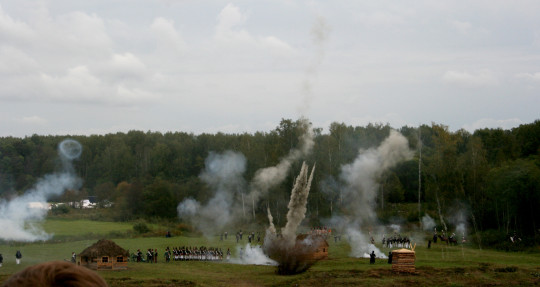Old habits die hard
‘It means that you have no money and it brings bad luck to everyone inside!’, she continues on a milder tone. It is the proof that for many people of the older generation certain habits, believes and superstitions are still very much alive.
Many customs just avoid bad luck; they normally speak for themselves. A Russian female student at the HSE tells me about the habits of knocking on wood, the danger of looking at your reflection in a broken mirror and the misfortune that comes with presenting gifts for- or congratulating someone with his birthday/parenthood in advance. Some traditions are of a more practical nature, as is the moment of silence before the departure of a relative or friend (preferably while the traveller sits on his suitcase). This is often conveniently written off as a time to think of anything one may have forgotten.
‘Russia is a state, but that does not make it a nation’
In my opinion the cultural differences are in some respects for the better. The tradition of not boasting about possible future successes or goals you set yourself before they are attained makes many Russians come across as humble and realistic. One of the consequences is however that a conversation about someone’s future plans can easily get stuck. A Western-European habit that Russians are firmly against is our extensive apologizing. We are used to say sorry on every possible occasion, something that Russians regard as unnecessary and even as snake-like behaviour. ‘It gives me the feeling that you are constantly dishonest and insincere’, my hostess in Suzdal told me, a town not far from Moscow.
Of another calibre are the traditions involving Russia’s military history. If you have seen some images of the military parade at the Red Square celebrating the 70th anniversary of Nazi Germany’s capitulation, you know what I mean. Their collective memory goes back much further even, as we have visited an enormous re-enactment of the battle of Borodino last week, which was one of the decisive battles with Napoleon in 1812. It was quite a surreal experience reading Lev Tolstoy’s monumental ‘War and Peace’, while the actual 19th century fighting he describes so vividly was taking place in the valley before us.

Asking one of my Russian friends about this fascination with war she tells me: ‘I think Russians really like to demonstrate their power and to celebrate their victories.’ Then again, her parents heard all the stories first-hand from her great-grandparents and they grew up watching the Soviet Realist war movies. Later she explains, ‘Such events also connect people, in Russia we are like strangers to each other.’ It is almost unimaginable how large Russia is and how many different cultures and ethnicities it entails. Russia is a state, but that does not make it a nation. ‘WWII is the only one event that can connect Russians and therefore the government uses this events and celebrations to evoke national spirit’, she concludes.
Whether it is singing the national anthem before a CSKA ice hockey match or the International Military Music Festival parades, Russia is indeed a lot different from The Netherlands. The Festival was almost a cultural trip to USSR times. It made the appearance of our southern neighbour’s all the more hilarious. Who would expect Belgians in carnival outfits on stilts after you saw the professional military marching bands of countries such as China, Kazakhstan and Belarus?




